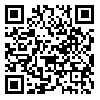چکیده: (901 مشاهده)
Background: Appropriate coping strategies employed by emergency nurses during a pandemic can help reduce their psychiatric issues and positively impact the quality of patient care. This study aimed to determine how different coping strategies of emergency nurses relate to their mental health symptoms during the COVID-19 pandemic.
Materials and Methods: This descriptive-correlational study was conducted on 125 emergency nurses in three teaching hospitals in Iran. The participants were included in the study using stratified random sampling. Data collection tools included the nurses' demographic and occupational characteristics questionnaire, the Perceived Stress Scale (PSS-14), the Hamilton Anxiety Rating Scale (HAM-A), the Hamilton Depression Rating Scale (HAM-D), and the Ways of Coping Questionnaire (WCQ). Significance was set at p < 0.05.
Results: According to the results, 97.5%, 66.4%, and 60.8% of the nurses experienced mild to severe stress, anxiety, and depression, respectively. In our study, nurses utilized emotion-oriented strategies mainly to manage their mental health symptoms. A statistically significant relationship existed between mental health symptoms and certain coping strategies (p<0.05). Increased stress, anxiety, and depression led nurses to adopt certain negative coping strategies, especially Escape-Avoidance, in addition to adopting positive coping strategies.
Discussion: Emergency nurses experience significant stress, anxiety, and depression, primarily using positive emotion-focused coping strategies. However, as their symptoms worsen, they shift towards negative coping behaviors.
Conclusions: Preventive interventions are crucial for emergency nurses, particularly during natural disasters, to reduce stress, anxiety, and depression by promoting effective coping strategies and mitigating negative ones, given the prevalence of mental health symptoms.
Materials and Methods: This descriptive-correlational study was conducted on 125 emergency nurses in three teaching hospitals in Iran. The participants were included in the study using stratified random sampling. Data collection tools included the nurses' demographic and occupational characteristics questionnaire, the Perceived Stress Scale (PSS-14), the Hamilton Anxiety Rating Scale (HAM-A), the Hamilton Depression Rating Scale (HAM-D), and the Ways of Coping Questionnaire (WCQ). Significance was set at p < 0.05.
Results: According to the results, 97.5%, 66.4%, and 60.8% of the nurses experienced mild to severe stress, anxiety, and depression, respectively. In our study, nurses utilized emotion-oriented strategies mainly to manage their mental health symptoms. A statistically significant relationship existed between mental health symptoms and certain coping strategies (p<0.05). Increased stress, anxiety, and depression led nurses to adopt certain negative coping strategies, especially Escape-Avoidance, in addition to adopting positive coping strategies.
Discussion: Emergency nurses experience significant stress, anxiety, and depression, primarily using positive emotion-focused coping strategies. However, as their symptoms worsen, they shift towards negative coping behaviors.
Conclusions: Preventive interventions are crucial for emergency nurses, particularly during natural disasters, to reduce stress, anxiety, and depression by promoting effective coping strategies and mitigating negative ones, given the prevalence of mental health symptoms.
| بازنشر اطلاعات | |
 |
این مقاله تحت شرایط Creative Commons Attribution-NonCommercial 4.0 International License قابل بازنشر است. |





